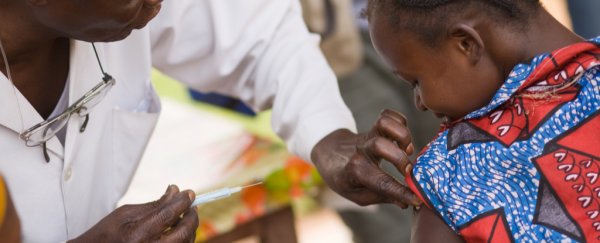By 2020, vaccination programs will have saved 20 million lives in the world's poorest countries, according to a new study.
But not only is immunisation preventing deaths, it's also proving to be an effective tool for making massive savings on health-care costs in areas of the world where every cent matters.
An international research team has now specifically measured the economic impact of vaccination in countries with low incomes, and found it to be extremely cost-effective, to the tune of US$350 billion savings.
The researchers investigated the impact of Gavi, The Vaccine Alliance - a global organisation whose explicit goal is to improve access to vaccination in world's poorest countries.
Gavi was formed in 2000 with a US$750 million five-year pledge from the Bill & Melinda Gates Foundation, and has since worked to bring together the public and private sector in an unprecedented effort to improve childhood immunisation.
And now we have evidence that those efforts are really paying off.
The team looked at numbers from 73 countries around the world whose per-capita gross national income in 2003 was lower than US$1,000. These countries, from Afghanistan to Zimbabwe, have been receiving Gavi support since 2001.
By compiling annual vaccine coverage data on 10 common vaccine-preventable diseases and adding data from Gavi strategic forecasts, the researchers developed a model for calculating the economic impact of these efforts.
Many of the diseases in question, such as measles, rotavirus, and Haemophilus influenzae type B, have a high impact on society - known as 'disease burden'.
This burden is quantifiable, so the team calculated the costs associated with each illness (loss and reduction of productivity due to death or disability, treatment costs, transportation costs and more) and estimated how many cases were averted by vaccination. The results were pretty impressive.
"Between 2001 and 2020 – just as a result of the vaccinations we investigated – each of our Gavi-supported study countries could expect to avoid a mean of approximately US$5 million in treatment costs per year," the team writes in the study.
It makes sense. In a society where fewer children die or are rendered disabled by preventable diseases, the long-term effect is a healthier and more productive workforce, where people don't have to spend their hard-earned savings on managing a devastating illness.
By 2020, vaccines for just 10 diseases will have saved 20 million lives, prevented 500 million cases of illness, and 9 million cases of long-term disability.
"Our examination of the broader economic and social value of vaccines illustrates the substantial gains associated with vaccination," says lead researcher Sachiko Ozawa from University of North Carolina at Chapel Hill.
The researchers even put a dollar figure on that value - for all the countries in the study, by 2020 vaccination will have brought a benefit that can be equated to US $820 billion.
Some of the data they used was inevitably patchy, as many of the world's poorest countries have limited empirical data on the factors included in the study - and the team admits that future analyses would benefit from collection of additional data.
But despite the limitations, the team emphasises that this new analysis clearly shows - not only do vaccines save lives, they are also a worthwhile economic investment with massive benefits for the world's neediest countries.
"Decision-makers need to appreciate the full potential economic benefits that are likely to result from the introduction and sustained use of any vaccine or vaccination program," says Ozawa.
The study was published in the Bulletin of the World Health Organization.
